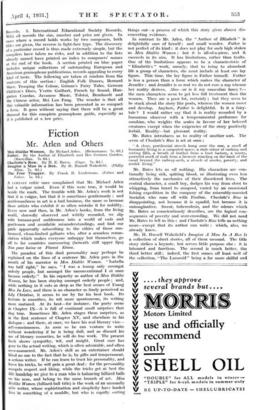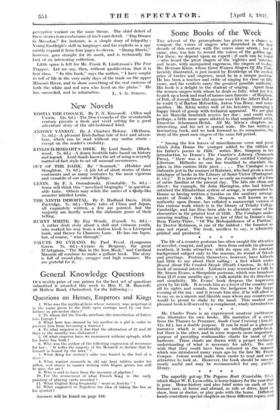Fiction
Mr. Arlen and Others
Charlotte's Row. By H. E. Bates. (Cape. 7s. 6d.) Imagine a Man in a Box. By H. Russell Wakefield. (Philip Allan. 7s. 6d.) The Free Trapper. By Frank B. Linderman. (Faber and Faber. is. 6d.) A CERTAIN critic once complained that Mr. Michael Arlen had a vulgar mind. Even if this were true, it would be beside the mark. The trouble with Mr. Arlen's work is not that it is vulgar, but that it is sometimes gentlemanly : and gentlemanliness in art is a bad business, the more so because those artists who exhibit it so often mistake it for nobility. Every now and then, in Mr. Arlen's books, from the living world, shrewdly observed and wittily recorded, we slip with banana-peel suddenness into a world of cads and gentlemen and avoidable misunderstandings, and find our guide apparently subscribing to the ethics of those sun- bronzed, clean-limbed gallants who, after a senseless renun- ciation which makes everyone unhappy but themselves, go off to far countries murmuring (beneath stiff upper lips) Non pour haine or Floreat Etona.
The paradox of this dual personality may perhaps be explained on the lines of a sentence Mr. Arlen puts in the mouth of his narrator in Men Dislike Women. " Isabella was half right," he says, " I was a tramp only amongst orderly people, but amongst the unconventional I at once became orderly." In his capacity as author of Men Dislike Women, he has been staying amongst orderly people ; and, while nothing in it cuts as deep as the best scenes of Young Men In Love, and there is no character as finely perceived as Lily Christine, it seems to me by far his best book. Its texture is smoother, its wit more spontaneous, its writing more matured. At its best—for instance, the party scene in Chapter IX—it is full of continual small surprises that ring true. Sometimes Mr. Arlen stages these surprises, as in the first sentence of Chapter XV, and elsewhere in his dialogue : and there, at once, we have his real literary vice— self-consciousness. As soon as he can venture to write without wondering if he is being dull, and so discard his use of literary cosmetics, he will do fine work. The present book shows sympathy, wit, and insight. Great care has gone to the actual writing, which is often admirable, and often over-mannered. Mr. Arlen's skill as an entertainer should blind no one to the fact that he is, by gifts and temperament, a serious writer. If he can learn to trust his personality, and leave his tricks, -he will gain a great deal; for the personality compels respect and liking, while the tricks get at best the idle handclap we give to a man who is balancing billiard balls On his nose, and belong to the same branch of art. Men Dislike Women (billiard-ball title) is the work of an unusually able writer, whose sophistication and simplicity have landed him in something of a muddle, but who is rapidly sorting
things out—a process of which this story giVes almost dis- concerting evidence.
In contrast to Mr. Arlen, the " Author of Elizabeth" is delightfully sure of herself : and small wonder. Father is not perfect of its kind : it does not play for such high stakes as Men Dislike Women : but it is all-of-a-piece, and it succeeds in its aim. It has limitations, rather than faults. One of the limitations appears to be a characteristic of " Elizabeth's " work, namely, that to bring to abundant life a group of characters, she must include at least one lay figure. This time, the lay figure is Father himself. Father is less a person than a force which makes the character of Jennifer : and Jennifer is so real we do not care a rap whence her reality derives. Also—or is it my masculine fancy ?— the men characters seem to get less full treatment than the women. They are a poor lot,. certainly ; but they seem to be stuck about the story like posts, whereas the women move and develop. Anyhow, Father is delightful. Is it a fairy- tale ? I would rather say that it is reality recorded by a humorous observer with a temperamental preference for sunshine, who weights the scales in favour of her beloved creatures except when the exigencies of the story positively forbid. Reality—but pleasant reality.
Mr. Bates introduces us to reality of another sort. The scene of Charlotte's Row is set at once : " A close, pestilential stench hung over the row, a smell of humanity living in a congested space, a stale odour of cooking and rotting filth, a breath of leather from a boot factory, a musty, powerful smell of malt from a brewery standing on the bank of tho canal beyond the railway-arch, a stench of smoke, poverty, and sordid living."
Mr. Bates lets us off nothing. His characters arc con- tinually being sick, spitting blood, or illustrating even less attractively the mechanics of their disordered lives. The central character, a small boy, dodges his way from clout to whipping, from brawl to cesspool, varied by an occasional fishing expedition in the company of the miserably-married Socialist who runs off with Pauline. Charlotte's Row is disappointing, not because it is squalid, but because it is unimaginative. Sweat, tuberculosis, and the odours which Mr. Bates so conscientiously describes, arc the logical con- sequences of poverty and over-crowding. We did not need Mr. Bates to tell us this : and Charlotte's Row tells us nothing more—except that its author can write : which, also, we already knew.
Mr. H. Russell Wakefield's Imagine A Man In A Boa is a collection of short stories, all of them unusual. The title story strikes a keynote, but serves little purpose else : it is laboured and facetious. The second is much better, the third better still ; indeed, the first comes off least well of the collection, "The Lazaroid" being a far more skilful and perceptive variant on the -same theme. The chief defect of these stories is an exuberance of irrelevant detail. "Day Dream in Macedon," for instance, is a simple story of telepathy : Young Eastleigh's skill in languages and his exploits as a spy 'nerdy expand it from four pages to. eleven: "Damp Sheets," however, goes straight for its mark, and' is technically the best of an interesting collection.
' Little space is left for Mr. Frank B. Linderman's The Free Trapper. Let me say, then, without qualification, that it is first class. " In this book," says the author, " I have sought to tell of life in the very early days of the trade on the upper Missouri River, and to show something of the real customs of both the white and red men who lived on the plains." He
has succeeded, and to admiration. L. A. G. STRONG.









































 Previous page
Previous page